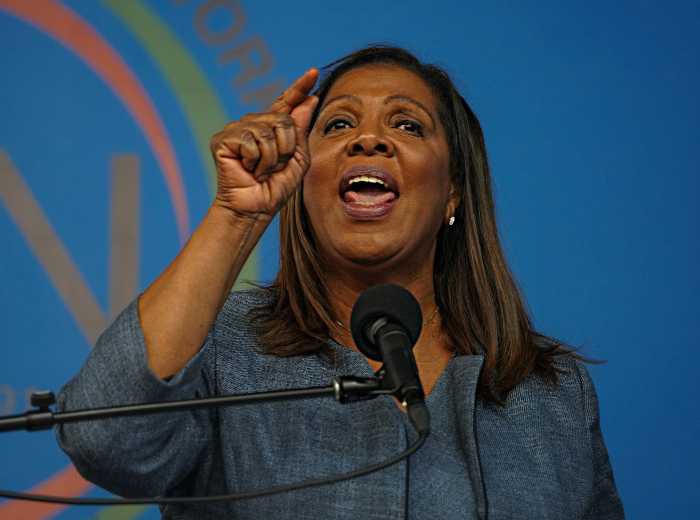
Cameron Johnson and Rachel Policar, at center, dazzled audiences and critics alike as Misha and Goldele in the National Yiddish Theatre Folksbiene’s revival of “The Golden Bride” last year at the Museum of Jewish Heritage. The show was such a hit that the museum is bringing the production back for another run this summer.
BY COLIN MIXSON
Call it a revival of the revival.
In December last year, the Museum of Jewish Heritage hosted the first full-theater revival of the Yiddish operetta “The Golden Bride” for the first time since the once-hit production fell into obscurity after the Second World War. The response to the National Yiddish Theatre Folksbiene production was so overwhelming — and tickets for the brief run so hard to come by — that the museum and NYTF decided to bring the critically acclaimed show back in July to give audiences another chance.
Last year’s revival of composer Joseph Rumshinsky’s Yiddish classic was made possible by the work of musicologist Michael Ochs, who labored for the better part of a decade recompiling the lost work after it slid into obscurity.
Downtown’s Museum of Jewish Heritage is the ideal venue to restage the operetta, according to its chairman, because it brings a unique snapshot of early Jewish-American to an institution dedicated to preserving the legacy of the Jewish experience.
“The most interesting thing to me is it’s unchanged since it was first shown in 1923,” said museum chairman Bruce Ratner. “My father came to this country in 1920, so I said, ‘my God, this is how he would have perceived America.’ It depicts Jewish life in the old country and in this country. It’s an incredible slice of what life was like at the time.”
“The Golden Bride” is kind of an early Jewish-American rom-com, which follows the heroine Godele from her whimsical — if impoverished — life in a Russian shtetl, to her immigration to the New World as a means of claiming a lavish inheritance bestowed by her estranged father.
While America is predictably shown as a sort of Promised Land, Ratner said the production’s fond depiction of old-world Russia, though common at the time, may surprise modern audiences.
“Any immigrant would have seen America as the land of golden opportunity, but Russia was also looked at as a possibly great place — an-up-and-coming country where everyone was treated equally,” he said.
The play was a big hit when it premiered at Kessler’s Second Avenue Theater in 1923, selling out the venue’s 2,000 seats.
But, after 25-years on the road, the production ultimately faded from the limelight, largely due to a dwindling familiarity with Yiddish among Jews who were more interested in integrating into mainstream American culture than passing on their old-world language to the next generation, according to Ochs.
“It was very popular and then after the 1940s the Yiddish theater pretty much died, because people didn’t speak Yiddish anymore,” said Ochs. “The Yiddish world was basically wiped out, and the Yiddish speaking people who came to America taught their children to speak English.”
The operetta was all but forgotten until the mid-1980s when Ochs, then a music librarian at Harvard’s Richard F. French Music Library, uncovered a partial manuscript containing a libretto and score for the forgotten play in an archive in Harvard’s Loeb Music Library. He translated a few pages of the manuscript for an event at the prestigious Ivy League school, and then quietly forgot about his findings for more than two decades.
Ochs would ultimately come to reexamine the work and undertook the challenge of recompiling and translating the material, which would eventually lead to its revival at the Museum of Jewish Heritage.
Since its debut at the museum, “The Golden Bride” has been nominated for two Drama Desk awards for outstanding revival of a musical and outstanding director of a musical, the only off-Broadway production in those categories.
Despite all his hard work, Ochs can still hardly believe the production’s success.
“If you had told me a year ago that this would be up for two awards, I couldn’t have believed you even in my wildest dreams,” he said.
“The Golden Bride” by the National Yiddish Theatre Folksbiene at the Museum of Jewish Heritage, July 4–Aug. 28. For showtimes, see www.mjhnyc.org or www.nytf.org. Tickets are available by phone: 866–811–4111, $40, $30 MJH/NYTF Members, $35 Groups of 10 or more. For group sales, contact groupsales@nytf.org or 212–213–2120 x204.



































